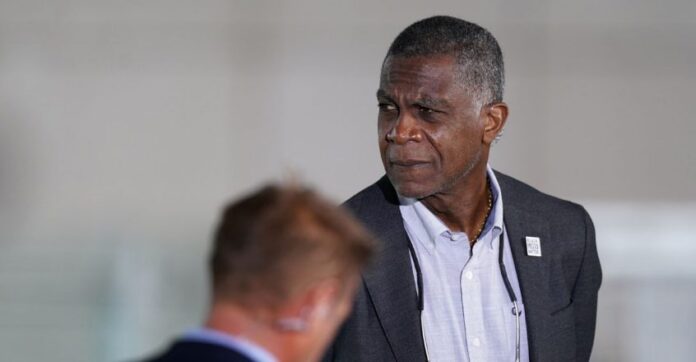LONDON: If, following his retirement from the commentary box, someone as respected as Michael Holding was moved to say that he will not miss cricket, then the reasons demand scrutiny. After a stellar career as a fearsome fast bowler for the West Indies between 1975-1987, he began television commentary in 1990 and latterly spent some 20 years with Sky.
During his playing days he was known as “whispering death,” so named because the umpires could not hear him running into bowl, so light were his steps and smooth his action. I remember well taking a group of cricketing colleagues from Newcastle-upon-Tyne to a Test match at Nottingham between England and the West Indies in 1980. We sat on the top tier of a stand opposite the pavilion, the end from which Holding was bowling. It was the first time that most of them had attended a Test match. They watched in awe as Holding loped in toward us, gathering momentum as he approached his point of delivery. The ball pitched and bounced and seemed to keep on climbing, giving the impression that its resting place would be one of our heads. A collective “Oooooh!” was let out by those around us at this prospect.
Holding’s ability to surprise with a cricket ball has been matched by the piquancy of his comments and views from the commentary box. He has criticized T20 as not being good for the game arguing that “it will be bad unless those in charge manage it properly and I do not think they can because they are blinded by money.”
During the 2019 World Cup, he openly criticized the decisions of several umpires, only to be informed that he should not cast “negative judgment.”
Holding’s riposte was to say that, as a former cricketer, he was of the view that “cricket should be held to a higher standard.” He questioned if it was an objective to “protect the umpires even when they do a bad job,” adding that “commentators are being more and more compromised by controlling organizations to the point of censorship.”
Most recently, he was highly critical of the England and Wales Cricket Board’s cancellation of short tours for both men’s and women’s teams to Pakistan because of concerns about the players’ “mental and physical well-being,” terming the decision as “Western arrogance.” In June 2021, his book “Why We Kneel, How We Rise” was published, in which his own testimony of racial abuse, along with those of other famous athletes, are dissected.
Apart from these concerns, Holding is of the opinion that the game is a very much changed one from that which existed when he started out on his journey. In particular, he judges that those responsible for managing the game are not doing it properly, choosing instead to manage the money that the game can bring in.
His views have received some pushback. There are those who feel that the way the game has moved on must be welcomed. Others have been quick to point out that, in 1977, Holding joined the breakaway World Series Cricket organized by the Australian broadcaster Kerry Packer. This ran in commercial competition to established international cricket, implying that Holding was not shy to move against the status quo for financial betterment. In 1979-80, during an ill-tempered New Zealand-West Indies series, he kicked the stumps over after having an appeal rejected, causing some to identify an anti-authoritarian streak in him.
There is also a sense that his views about T20 cricket do not recognize the possibilities that the Indian Premier League has opened up for young people to choose cricket as a career or that T20 cricket has provided the opportunities for the game to develop in countries where it previously had no foothold. Whether he or others of his generation like it or not, the shorter game in the form of T20 and its variants is here to stay for the foreseeable future.
It is Holding’s rally cry concerning the governance of the game that deserves the most attention. No one can doubt that money has taken hold of the game and seems to be influencing those who make decisions about its future. In Pakistan, still smarting from the cancellation of visits by New Zealand and England, Ramiz Raja, chair of the Pakistan Cricket Board, has expressed deep concerns. Since the PCB is 50 percent funded by the International Cricket Council, which in turn is heavily funded by the Board of Control for Cricket in India, he feels it is at the mercy of India for its survival. Remarkably, Raja has revealed that an investor is ready to give him a blank check if Pakistan beats India in a World Cup group match on Oct. 24.
Meanwhile, the England and Wales Cricket Board’s governance actions have left it open to criticism. Hard on the heels of the decision to cancel the tours to Pakistan, for which only a press release was provided by way of explanation, its chairman stepped down on Oct. 7 after serving only 13 months of a five-year contract, citing pandemic-induced pressures. After prevarication over the decision to give the green light to the Ashes tour, an announcement was made on Oct. 9 that it would go ahead “subject to several critical conditions.” These are thought to relate to further negotiations taking place with Cricket Australia. Surprisingly, there has been no public word of or from the CEO of the England and Wales Cricket Board since his involvement with the cancellation of the England-India Test match at Manchester on Sept. 10.
Holding’s questioning of the ability or preparedness of the game’s off-field custodians to preserve the soul, standards and integrity of the game requires careful monitoring. The current emphasis on bolstering profit/loss accounts in India, Australia and England, partly induced by the pandemic, does not augur well for the game unless the benefits are spread more widely. Only when the pandemic’s impacts fade away will the appetite for this become apparent.

